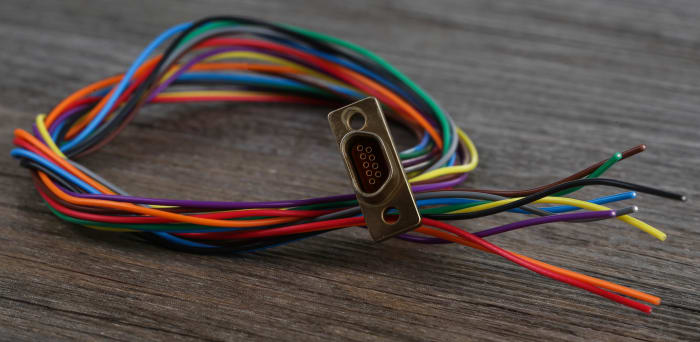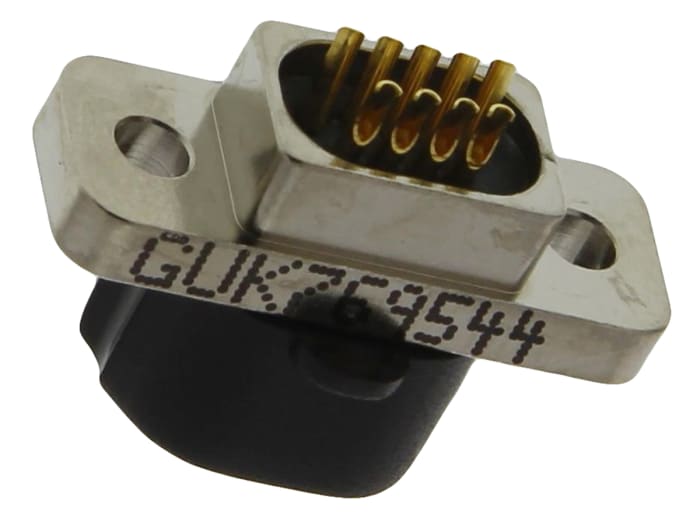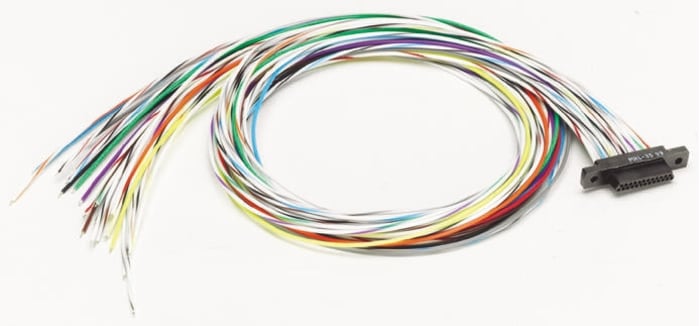RS PRO 9 Way Panel Mount D-sub Connector Socket

Technical Document
Specifications
Brand
RS ProNumber Of Contacts
9
Gender
Female
Body Orientation
Straight
Mounting Type
Panel Mount
D Connector Type
Micro-D
Termination Method
Solder
Current Rating
3A
Housing Material
Aluminium
Voltage Rating
250.0 V
Length
19.68mm
Width
7.57mm
Depth
10.64mm
Dimensions
19.68 x 7.57 x 10.64mm
Contact Plating
Gold
Contact Material
Copper Alloy
Minimum Operating Temperature
-55.0°C
Maximum Operating Temperature
+135°C
Country of Origin
United Kingdom
Product details
RS PRO Micro-D High-Density D-Sub Connector with Solder Cups
From RS PRO a durable high density, high-performance Micro-D D-Sub connector designed for use in rugged and demanding environments. The metal shell of this connector provides both EMI & RFI shielding. This d-sub also features an interfacial seal which offers protection to the contacts against moisture and humidity. This D-sub connector has a compact design with a contact pitch of just 1.27mm which means it is ideal for use in applications where weight and space need to be kept at a minimum.
What is a Micro-D Connector?
A Micro-D connector is derived from the D-Sub connector and is also known as a microminiature D and is smaller and about half the length of the subminiature version. This connector has the same D-shaped metal shield the d-subminiature which provides mechanical support. The D-shape also ensures the correct orientation when mated and improves installation reliability. These microminiature D connectors are available as female D-sub sockets (or d-sub receptacles) with female contacts or male D-sub plugs with male pin contacts. The socket style female connector mates with the plug style male connector. Please note that a D-sub with a plastic shell cannot be mated with a D-sub with a metal shell.
Features and Benefits
• Durable and rugged design
• Reliable with a high performance
• Lightweight with a compact space-saving high-density design
• Rugged aluminium shell for extra strength and EMI/RFI shielding
• Interface seal isolates contacts from one another and protects them against moisture and humidity
• Gold plated pin and receptacle contacts provide resistance to shock and vibration
• Flanges on either side of the shell for screw mounting to a panel
• Solder cups for simple wire termination
Applications
This highly reliable d-sub connector with its robust and compact design can be used within rugged industrial and commercial environments. Applications for these D-sub plugs and sockets include the following:
• Networking and communications equipment
• Data processing equipment
• Sensors and data loggers
• Industrial and medical equipment
• Portable electric generation equipment
• Aircraft and Spacecraft applications
Frequently Asked Questions
How do you terminate the wires into the connector?
These d-subs feature solder cups which are hollow cup-like cavities into which the wire is inserted and secured by soldering. Firstly make sure the connector is held securely while working on it. Strip the ends of each wire using the depth of solder cups to gauge how much insulation you need to remove. Tin the exposed wire strands with a soldering iron and partially fill the solder cup with solder. Apply a soldering iron to the edge of the cup allowing the solder to melt. Insert the end of the tinned wire into the solder cup and hold it in place until the solder becomes solid. If the wire gauge is large enough to support itself in the cup place it in the cup and feed in the solder whilst applying the soldering iron to the back of the cup.
How do you mount these connectors?
These d-subs are designed to be panel mounted. A hole is cut in the panel which is determined by the panel cut-out dimensions of the plug or socket. Two mounting flanges either side of the connector incorporate mounting holes. Holes are drilled into the panel to align with these mounting holes. The connector is then inserted into the panel cut-out and secured in place by inserting screws through the holes in both the connector and panel.
Stock information temporarily unavailable.
P.O.A.
1
P.O.A.
Stock information temporarily unavailable.
1
Technical Document
Specifications
Brand
RS ProNumber Of Contacts
9
Gender
Female
Body Orientation
Straight
Mounting Type
Panel Mount
D Connector Type
Micro-D
Termination Method
Solder
Current Rating
3A
Housing Material
Aluminium
Voltage Rating
250.0 V
Length
19.68mm
Width
7.57mm
Depth
10.64mm
Dimensions
19.68 x 7.57 x 10.64mm
Contact Plating
Gold
Contact Material
Copper Alloy
Minimum Operating Temperature
-55.0°C
Maximum Operating Temperature
+135°C
Country of Origin
United Kingdom
Product details
RS PRO Micro-D High-Density D-Sub Connector with Solder Cups
From RS PRO a durable high density, high-performance Micro-D D-Sub connector designed for use in rugged and demanding environments. The metal shell of this connector provides both EMI & RFI shielding. This d-sub also features an interfacial seal which offers protection to the contacts against moisture and humidity. This D-sub connector has a compact design with a contact pitch of just 1.27mm which means it is ideal for use in applications where weight and space need to be kept at a minimum.
What is a Micro-D Connector?
A Micro-D connector is derived from the D-Sub connector and is also known as a microminiature D and is smaller and about half the length of the subminiature version. This connector has the same D-shaped metal shield the d-subminiature which provides mechanical support. The D-shape also ensures the correct orientation when mated and improves installation reliability. These microminiature D connectors are available as female D-sub sockets (or d-sub receptacles) with female contacts or male D-sub plugs with male pin contacts. The socket style female connector mates with the plug style male connector. Please note that a D-sub with a plastic shell cannot be mated with a D-sub with a metal shell.
Features and Benefits
• Durable and rugged design
• Reliable with a high performance
• Lightweight with a compact space-saving high-density design
• Rugged aluminium shell for extra strength and EMI/RFI shielding
• Interface seal isolates contacts from one another and protects them against moisture and humidity
• Gold plated pin and receptacle contacts provide resistance to shock and vibration
• Flanges on either side of the shell for screw mounting to a panel
• Solder cups for simple wire termination
Applications
This highly reliable d-sub connector with its robust and compact design can be used within rugged industrial and commercial environments. Applications for these D-sub plugs and sockets include the following:
• Networking and communications equipment
• Data processing equipment
• Sensors and data loggers
• Industrial and medical equipment
• Portable electric generation equipment
• Aircraft and Spacecraft applications
Frequently Asked Questions
How do you terminate the wires into the connector?
These d-subs feature solder cups which are hollow cup-like cavities into which the wire is inserted and secured by soldering. Firstly make sure the connector is held securely while working on it. Strip the ends of each wire using the depth of solder cups to gauge how much insulation you need to remove. Tin the exposed wire strands with a soldering iron and partially fill the solder cup with solder. Apply a soldering iron to the edge of the cup allowing the solder to melt. Insert the end of the tinned wire into the solder cup and hold it in place until the solder becomes solid. If the wire gauge is large enough to support itself in the cup place it in the cup and feed in the solder whilst applying the soldering iron to the back of the cup.
How do you mount these connectors?
These d-subs are designed to be panel mounted. A hole is cut in the panel which is determined by the panel cut-out dimensions of the plug or socket. Two mounting flanges either side of the connector incorporate mounting holes. Holes are drilled into the panel to align with these mounting holes. The connector is then inserted into the panel cut-out and secured in place by inserting screws through the holes in both the connector and panel.


